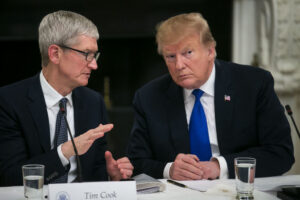Last updated:
 Why Trust Cryptonews
Why Trust Cryptonews

The U.S. Securities and Exchange Commission (SEC) is reportedly planning to eliminate the roles of regional directors in its 10 regional offices as part of broader cost-cutting measures driven by the Trump administration.
According to a Reuters report, the SEC informed regional directors of their impending job losses on February 21, with the agency set to submit its restructuring plan next month officially.
While the regional offices will remain operational, this move is part of a sweeping initiative to reduce government spending, spearheaded by President Donald Trump and his special advisor, billionaire Elon Musk.
The cost-cutting measures coincide with a broader reshaping of U.S. regulatory agencies under Trump’s administration.
The newly created Department of Government Efficiency (DOGE), led by Musk, has been instrumental in identifying potential areas for government downsizing.
The SEC, under pressure to comply, is expected to submit recommendations for drastic cuts.
The Role of DOGE and the Trump Administration’s in the SEC Reformation
The Trump administration has aggressively pursued a strategy of reducing the federal workforce, arguing that downsizing will create a more efficient and fiscally responsible government.
Elon Musk’s Department of Government Efficiency (DOGE) has been at the forefront of this effort, with its reported mandate to identify waste, fraud, and inefficiencies within federal agencies.
DOGE-affiliated accounts on Musk’s social media platform X have been actively soliciting tips from the public on SEC inefficiencies.
On February 18, a DOGE-related X account specifically focused on the SEC urged users to report instances of waste and fraud.
While the effectiveness of this crowdsourced oversight remains unclear, the push reflects a broader trend of outsourcing government efficiency efforts to the public and private sectors.
For the SEC, the immediate impact of these cuts is already becoming apparent.
The agency has been directed to submit its restructuring plans to Acting Chairman Uyeda by February 25, with a focus on streamlining operations.
The SEC previously closed its Salt Lake City regional hub in June 2024, citing significant attrition following its high-profile defeat in the DEBT Box case, which led to a $1.8 million fine for bad faith conduct.
However, sources suggest there are no plans to close additional regional offices.
You might also like
The Impact on the SEC’s Regulatory and Crypto Oversight
One of the most significant changes under the new SEC leadership has been a shift in its regulatory focus, particularly concerning the crypto industry.
Under former Chairman Gary Gensler, the SEC took an aggressive stance on crypto enforcement, filing lawsuits against major industry players and expanding its crypto enforcement unit.
However, since Trump’s re-election, the agency has scaled back its crypto-related investigations and reassigned key personnel.
The SEC has reduced the scope of its crypto enforcement team, paused several lawsuits against crypto firms (most recently Coinbase, Robinhood, and Opensea), and even reassigned its former top crypto litigator to the agency’s IT department.
Acting Chairman Uyeda has been vocal that the agency will focus on developing clearer regulatory policies rather than pursuing aggressive enforcement actions.
He has also emphasized that the agency must deploy its enforcement resources judiciously, which is a departure from the previous administration’s approach.
This can be seen in the recently created Cyber and Emerging Technologies Unit (CETU) to combat cyber-related misconduct and protect retail investors in the crypto sector.
Looking forward, the SEC’s restructuring is part of Trump’s reformation, which aims to remove the scrutiny caused by the previous administration. However, some critics warn that gutting the agency’s enforcement capabilities could leave investors more vulnerable to fraud and misconduct.
Others argue that the SEC’s recent actions align with the Trump administration’s broader deregulatory agenda, which seeks to reduce government strict intervention in financial markets.


















